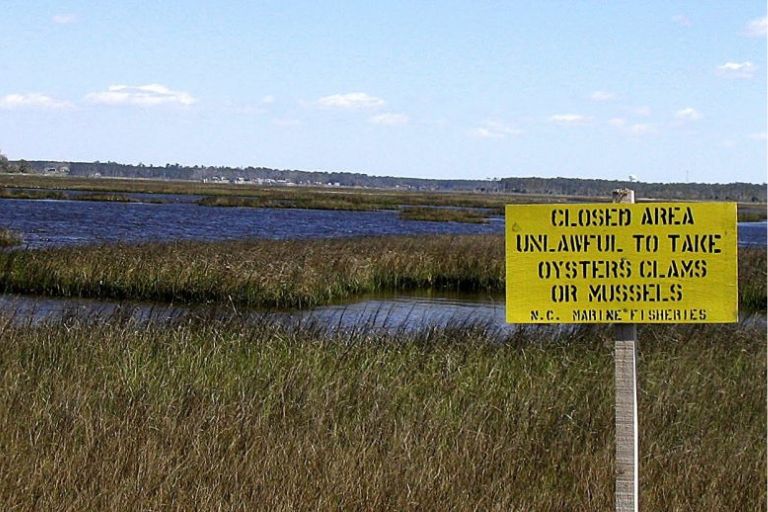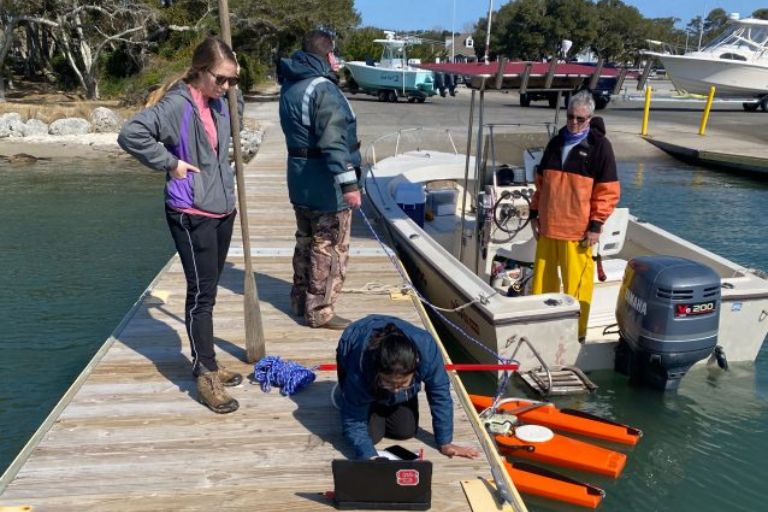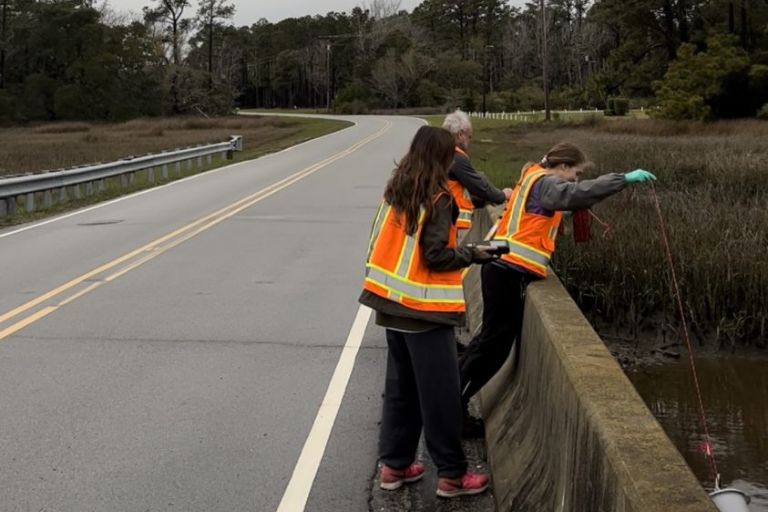Saving the Newport River
North Carolina Coastal Federation

Small river, mighty resource
A 12-mile river runs from North Carolina’s famous Croatan National Forest into the Bogue Sound, which empties into the Atlantic Ocean near Morehead City and Beaufort.
The Newport River is relatively small, but it is one of the most valuable water bodies in North Carolina. The river supports oyster and shellfish habitats, as well as swimming and tourism.
These activities are critical economic drivers for the region, but they require clean water, and the water quality in the Newport River has been declining for decades. The water has gotten so bad that the state frequently closes areas of the river to human activities.
Closures are especially common after storms, which, because of climate change, are now more frequent and severe. These closures are necessary to keep people safe but also lead to significant challenges for those who rely on the river for fishing, oystering or other activities.
How we got here
Bree Charron is a biological and agriculture engineer who leads the water quality team at the North Carolina Coastal Federation (NCCF).
Bree explains that hundreds of years ago, when the North Carolina coast was all pine forests, wetlands and other natural landscapes, rainwater had more places to go. The trees would intercept it, or the soil would absorb it. Some of the water would eventually make its way to rivers and streams, but it was a slow process that didn’t disrupt the surrounding ecosystem.
Now, because of human development, rain becomes polluted stormwater runoff that shoots directly into rivers like the Newport. The forests that once received the water have been felled by timber companies. The muddy, treeless ground cannot absorb water like the forests could, so stormwater picks up huge quantities of sediment. And in areas where people live, rainwater runs across roofs and sweeps through streets, picking up oil, gas and bacteria along the way.
Without the buffer of forests and other natural landscapes, all of this is deposited directly into the Newport River, wreaking havoc on the river’s health.
The sediment buries once thriving oyster habitats. “It comes in too fast for the oysters to grow,” Bree says. “It smothers them.”
The stormwater also carries unwelcome nutrients and bacteria, like vibrio, that can be dangerous to people who swim in infested waters or eat contaminated shellfish.
“Turning back the clock” on stormwater runoff
NCCF, whose homebase of Newport, NC, sits on the Newport River, is leading more than a dozen partners in a collaborative effort to “turn back the clock” on harmful stormwater runoff in order to protect the river now and for future generations. The group includes local and state government, universities, local businesses and other nonprofits.
Their goal is to restore the river so it is once again a safe place for North Carolinians to fish, grow oysters, swim and do other recreational activities.
The group’s first step was to develop a strategic restoration plan for the Newport River. The planning phase alone was an enormous effort.
Researchers from NC State University collected and analyzed water quality data and long-term watershed trends, working together to identify areas of the Newport River that were especially prone to contamination.
The group also evaluated the influence of rainfall and landscape changes on river pollution.
One piece of critical information, for example, came from a UNC professor whose data showed that when a timber company cleared 3,000 acres of forest next to the Newport River in the 1960s, it deposited an enormous amount of sediment and almost immediately changed the makeup and water quality of the river. Since that first timber clearing, the sediment hasn’t let up, and the river has never recovered.
As part of the planning process, NCCF also traveled the affected area with representatives from each nearby local government, including Carteret County, Morehead City, the Town of Beaufort and the Town of Newport. That led to NCCF partnering with governments on different challenges outside of the river restoration effort, like retrofitting an area of Beaufort that was experiencing frequent flooding.
The group’s river protection plan includes strategies for retrofitting, which means improving or installing stormwater best management practices around the river, and restoration, which means restoring or conserving habitat that will help protect the river from stormwater runoff.
Once approved by the state, the plan will become eligible for federal Clean Water Act funding to support implementation.
What’s at stake
While the plan awaits official approval, some implementation is already underway.
For example, Weyerhaeuser timber company, which owns thousands of acres of land along the Newport, has agreed to sell the land to the NC Coastal Land Trust, a partner of NCCF. With the land secured for conservation efforts rather than new development, NCCF will then be able to retrofit and restore the land to make it more resilient during storms and floods, ultimately preventing stormwater runoff from harming the river.
These partnerships are critical, Bree says. Without them, developers would likely purchase those tracts for housing or other human activities, leading to a snowball effect of development on that corridor of the river that would continue to worsen the water quality over time.
But thanks to the efforts of NCCF and their partners, Bree sees an exciting future ahead for the Newport River and the communities that depend on it for economic activity and recreation.
“It’s all going to be public land in the end,” Bree says. NCCF and their partners, working with community members, will put together an inclusive plan for river use. “Maybe trails, a kayak launch — it’s fun to dream up what we’ll be able to do with the community.”

“It’s all going to be public land. It’s fun to dream up what we’ll do with the community.”
— Bree Charron, North Carolina Coastal Federation
More News + Stories
ZSR Awards $9.4 Million to Organizations Working for Systemic Change in NC
The grants support nonprofit organizations working to change policies, power structures and other root causes of challenges so that all North Carolinians can lead fulfilling lives.
Read MoreZSR Announces $19.2 Million in Funding to Organizations Working for Systemic Change in NC
The grants support nonprofit organizations working to change policies, power structures and other root causes of challenges so that all North Carolinians can lead fulfilling lives.
Read MoreNorth Carolina Local News Lab Fund announces Press Forward Charlotte
This week, the North Carolina Local News Lab Fund announced the launch of Press Forward Charlotte, a new local chapter of Press Forward North Carolina. Press Forward Charlotte is a platform to fuel investment in Charlotte’s news and information ecosystem and spur collaboration among local funders. The launch comes as several local Charlotte funders make new…
Read More

